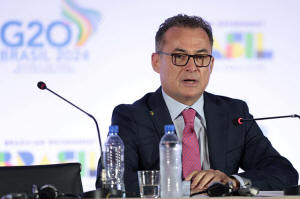|
"The inflation picture looks very good," Nagel told German radio
Deutschlandfunk. "We are now assuming, and the data has shown,
that we will reach our inflation target of 2% by the end of the
next year."
Villeroy went further, saying the "direction of the journey" was
clearly for lower interest rates, albeit at a gentle pace that
relied on incoming data.
"We should continue to reduce gradually and as appropriate the
degree of restriction of our monetary policy," he told the
Eurofi financial forum in Budapest.
"But the pace has to be highly pragmatic: we are not
pre-committing to any particular rate path, and we keep our full
optionality for our next meetings."
Inflation in the 20 countries sharing the euro currency fell to
2.2% in August, the slowest pace since July 2021, and the ECB
expects it to fall to 2% by the last quarter of next year after
a slight rebound in the coming year.
Growth is also flagging, particularly in industrial powerhouse
Germany, strengthening the case for lower borrowing costs.
Villeroy said the inflation projections and disappointing
activity data made Thursday's rate cut an "obvious" move and the
ECB should now also pay attention to the risk of inflation
coming in too low.
His Finnish colleague Olli Rehn said the reduction in borrowing
costs would support growth but Europe should get on the road to
better productivity.
The Bundesbank and the Banque de France have the biggest shares
in the ECB's capital in light of the size of their country's
economy and population.
(Reporting by Balazs Koranyi; writing by Francesco Canepa in
Frankfurt; Editing by Gareth Jones and Alex Richardson)
[© 2024 Thomson Reuters. All rights
reserved.]
This material may not be published,
broadcast, rewritten or redistributed.
Thompson Reuters is solely responsible for this content.

|
|




